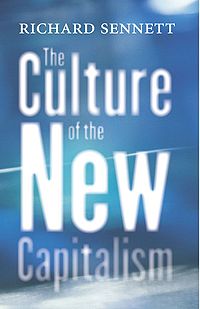
The Culture of the New Capitalism
Encyclopedia

Richard Sennett
Richard Sennett is the Centennial Professor of Sociology at the London School of Economics and University Professor of the Humanities at New York University...
which covers politics, economics, sociology and psychology.
Chapters
- "Bureaucracy"
- "Talent and the Specter of Uselessness"
- "Consuming Politics"
- "Social Capitalism in Our Time"
Analysis
Based on the author's Castle Lectures at YaleYALE
RapidMiner, formerly YALE , is an environment for machine learning, data mining, text mining, predictive analytics, and business analytics. It is used for research, education, training, rapid prototyping, application development, and industrial applications...
, this book is a sociological study of the influence of the New Economy
New Economy
The New Economy is a term to describe the result of the transition from a manufacturing-based economy to a service-based economy. This particular use of the term was popular during the Dot-com bubble of the late 1990s...
on human relationships. Sennett describes the transformations that have taken place in postmodern capitalism
Capitalism
Capitalism is an economic system that became dominant in the Western world following the demise of feudalism. There is no consensus on the precise definition nor on how the term should be used as a historical category...
as corporations have become more diffuse, unstable, and decentered. Contrasted with the 'iron cage' bureaucracy
Bureaucracy
A bureaucracy is an organization of non-elected officials of a governmental or organization who implement the rules, laws, and functions of their institution, and are occasionally characterized by officialism and red tape.-Weberian bureaucracy:...
described by Weber
Max Weber
Karl Emil Maximilian "Max" Weber was a German sociologist and political economist who profoundly influenced social theory, social research, and the discipline of sociology itself...
– those pyramid-like corporate structures in which individuals knew their place and planned their futures – modern corporations provide no long-term stability, benefits, social capital, or interpersonal trust.
Sennett first looks at bureaucracy in early capitalism. Most businesses were short lived and unstable. However, in the latter half of the 19th century, business was modelled on predictable military lines where all roles were defined and career progression could be mapped out. This new model aimed at social inclusion, that is, most would work at the base of the social pyramid
Social Pyramid
A social pyramid is a model of social people. The people with whom an individual has the least amount of social intimacy are placed at the foundation of the pyramid. At the top of the pyramid is the individual. And on each subsequent layer going down, the individual has less and less intimacy...
, hopefully progressing to the tip.
Modern capitalism looks at this model with disdain – too many superfluous people are employed to remain competitive and people should constantly adapt and prove themselves to be assets. Therefore, in large modern businesses, the majority of workers face uncertainty and find it difficult to conceive of a life narrative. Due to mechanization
Mechanization
Mechanization or mechanisation is providing human operators with machinery that assists them with the muscular requirements of work or displaces muscular work. In some fields, mechanization includes the use of hand tools...
and the need for upskilling, managers as well as their subordinates face the possibility of obsolescence
Obsolescence
Obsolescence is the state of being which occurs when an object, service or practice is no longer wanted even though it may still be in good working order. Obsolescence frequently occurs because a replacement has become available that is superior in one or more aspects. Obsolete refers to something...
. Concepts such as craftmanship and getting the job right are seen as wasteful and somewhat obsessive.
Capitalism's need for potential is increasingly reflected in the education system. SAT
SAT
The SAT Reasoning Test is a standardized test for college admissions in the United States. The SAT is owned, published, and developed by the College Board, a nonprofit organization in the United States. It was formerly developed, published, and scored by the Educational Testing Service which still...
s favour superficial and adaptive reasoning rather than deeper introspection on the meaning of things. Finally, comparisons are made between brand
Brand
The American Marketing Association defines a brand as a "Name, term, design, symbol, or any other feature that identifies one seller's good or service as distinct from those of other sellers."...
ing and politics
Politics
Politics is a process by which groups of people make collective decisions. The term is generally applied to the art or science of running governmental or state affairs, including behavior within civil governments, but also applies to institutions, fields, and special interest groups such as the...
. Products such as cars are physically very similar, but branding creates differences on minor issues revolving around appearance and emotion. Sennett views this same 'goldplating' process as having a largely negative influence on modern politics where presentation is key.
Edition
- The Culture of the New Capitalism (Yale University PressYale University PressYale University Press is a book publisher founded in 1908 by George Parmly Day. It became an official department of Yale University in 1961, but remains financially and operationally autonomous....
, 2006), 214pp. (ISBN 0-300-10782-X). Originally delivered as Castle Lectures in Ethics, Politics, and Economics at Yale UniversityYale UniversityYale University is a private, Ivy League university located in New Haven, Connecticut, United States. Founded in 1701 in the Colony of Connecticut, the university is the third-oldest institution of higher education in the United States...
in 2004.
Further reading
- Zygmunt BaumanZygmunt BaumanZygmunt Bauman is a Polish sociologist who, since 1971, has resided in England after being driven out of Poland by an anti-Semitic campaign, engineered by the Communist government which he had previously supported...
: Liquid Love: On the Frailty of Human Bonds (Cambridge: Polity Press, 2003) (ISBN 0-7456-2489-8).

